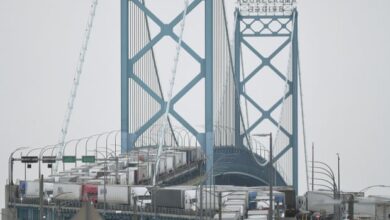Compromise on the Irish backstop wont save Theresa Mays Brexit deal

With the postponed vote on her Brexit deal looming, Theresa May is staking everything on the possibility that she might be able to extract some sort of assurance on the Irish border that will placate her sometime parliamentary allies in the DUP.
Theres a consistent logic to the Prime Minister doing so. Without a time limit on the backstop, there is no way that Arlene Fosters ten MPs will vote for the Withdrawal Agreement – and if the Withdrawal Agreement doesnt bear the imprimatur of the DUP, the dozens of Conservative MPs who cited the importance of the Union as their motivation for opposing it wont be convinced either.
The only way May might satisfy these two groups is through a substantive change to the text of the Withdrawal Agreement itself. She has made clear that this is not something she is seeking, and the EU has made clear that it would not allow it anyway. For now, the very best May will get is a separate set of assurances that will sit alongside, but not alter, the binding international treaty that so many MPs hate.
Until the position of the DUP changes, that wont be good enough, and theres no reason to assume that it will. Ditto the EU27: should they change their position on the need for a backstop – permanent or otherwise – then dozens of MPs will come back into play. But, again, they are very unlikely to do so.
Mays pitch to her party ahead of the vote of no confidence in her leadership last month was that she would win back the support of the DUP and with it the support of the Commons for the withdrawal agreement. Her aversion to compromise on ending of freedom of movement and working on a cross-party basis to find another solution means this was always the only politically viable way she could proceed.
For the reasons outlined above, the chances of the Prime Minister succeeding are slim. But even if she did extract a concession from the EU on the backstop that satisfied the DUP, the problem on her own benches wouldnt go away, even if it convinced a sizeable number of Conservative MPs to back the Withdrawal Agreement.
That much has been made clear by a succession of hardline Tory Eurosceptics today. Speaking on the Today programme this morning, Bernard Jenkin warned that a hard core of Conservative MPs would vote against the deal regardless of whether the DUP were brought back onside.
Reinforcing this inconvenient truth, as Brexit Secretary Steve Barclay responded to an urgent question in the Commons this afternoon, were Bill Cash and John Redwood. Both stressed that the backstop was “not the whole story by any means” and offered a litany of other grievances, such as the divorce bill and continuing jurisdiction of the European Court of Justice. Jacob Rees-Mogg is wont to make a similar argument.
They are not alone. There are at least a dozen more Conservative MPs who are so doctrinaire on Europe that they will not countenance voting for the Withdrawal Agreement on for reasons such as these, regardless of how the ground shifts around them. Add to this the MPs for whom voting against the deal is a political imperative – like Boris Johnson – and the working majority of 13 that the Conservatives have with the DUP is very quickly wiped out. Even in the best case scenario, Theresa May will have to rely on the votes of a group she has proved singularly unable and unwilling to court: Labour MPs
Patrick Maguire is the New Statesman's political correspondent.

[contf]
[contfnew]

new statesman america
[contfnewc]
[contfnewc]



